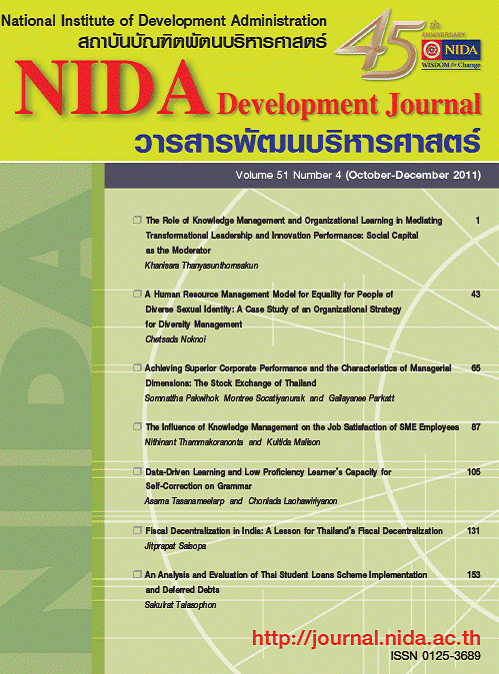Fiscal Decentralization in India: A Lesson for Thailand’s Fiscal Decentralization การกระจายอำนาจการคลังในประเทศอินเดีย: บทเรียนสำหรับการกระจายอำนาจการคลังในประเทศไทย
Keywords:
Fiscal Decentralization, Local Government, Panchayati Raj Institution, AccountabilityAbstract
This study presents an analysis of fiscal decentralization in India as a possible model for fiscal decentralization in Thailand. Thailand can benefit from India’s experience in the following: a) the decision of the Indian central government and state government to deal with the fiscal decentralization program; b) the structure and impact of the local autonomous governance bodies concerning the fiscal decentralization program; and c) the examination of the policy impact and role of the Panchayati Raj Institutions and local Panchayats in dealing with the fiscal decentralization program. This study attempts to: understand the decision to implement fiscal decentralization and its impact in India, obtain insights into the cooperation of multi-layered governance in coping with fiscal decentralization in India, suggest ideas for implementing fiscal decentralization in Thailand, study examples of fiscal decentralization in multicultural societies and their relevance to potential problems in Thailand. The major findings can be summarized as follows: - Strong mechanisms of accountability will improve the distribution of benefits to groups that are traditionally marginalized in local political processes. The problems most commonly associated with a lack of decentralization in India are: federal constraints, a resistant bureaucracy, and local élite capture. Many States in India have tended to retain powers of appointment, transfer, revenue generation, spending, etc. at the expense of the Panchayats. The power on which citizens can counterbalance the power of public officials may be based on the hierarchical authority of the bureaucratic state (upward accountability) or on the general consent of the citizenry (downward accountability),or on a combination of the two. In its most ideal form, accountability should be based on strong norms of communication and consultation between public officials and citizens. We have developed five general propositions regarding the conditions under which decentralization can lead to improved accountability for poor and marginal groups in society:1) active participation among broad elements of society, involving activities such as voting, campaigning, attending meetings, running for office, lobbying representatives, etc.;2) fiscal and political support from higher level authorities within government;3) the existence of competitive political parties whose legitimacy depends at least in part on the support of the poor;4) deeper economic transformations, which embolden traditionally subordinate groups to challenge local authority structures;5) balance fiscal decentralization between the expenditure assignment and revenue assignment with the voice and exit processes.Thus, the political structures created by the decentralization processes in India are sufficiently different to generate an interesting comparison of the ways in which formal processes of decentralization can affect accountability and participation at the local level. Our principal unit of analysis is the Gram Panchayat and within it the Gram Sabha. Additionally, the regional variation will help us to understand the ways in which the regional political economy has influenced patterns of political mobilization _ and thus participation and accountability _ in the Gram Sabha and Gram Panchayats. The policy recommendation has been to mobilize the financial resource of Panchayats and to enable them to function and govern smoothly. The local government and development priorities should be based on local needs and requirements.
การศึกษานี้ได้นำเสนอการวิเคราะห์การกระจายอำนาจการคลังในประเทศอินเดีย เพื่อกระตุ้นการกระจายอำนาจการคลังในประเทศไทย ประเทศไทยสามารถได้รับประโยชน์จากประสบการณ์ในประเทศอินเดีย ดังนี้ ก) การตัดสินใจของรัฐบาลกลางอินเดียและรัฐบาลแต่ละรัฐ ในการดำเนินการเกี่ยวกับการกระจายอำนาจการคลัง ข) โครงสร้างและผลกระทบของการปกครองท้องถิ่นเกี่ยวกับองค์กรการกระจายอำนาจการคลัง และ ค) การตรวจสอบผลกระทบเชิงนโยบาย และบทบาทของสถาบันปัจญาติราช (Panchayati Raj Institution) ซึ่งเป็นองค์กรการปกครองท้องถิ่น ด้านการกระจายอำนาจการคลัง การศึกษานี้พยายามศึกษา เข้าใจการตัดสินใจและผลกระทบเกี่ยวกับการกระจายอำนาจการคลังของประเทศอินเดีย โดยการสังเกตการณ์ความร่วมมือระหว่างการปกครองส่วนกลาง และการปกครองส่วนท้องถิ่น ด้านการดำเนินการการกระจายอำนาจการคลัง การให้คำแนะนำ ความคิดเห็นเกี่ยวกับประเภท สถานภาพ ด้านการกระจายอำนาจและผลกระทบในประเทศไทย บทเรียนจากการปกครองท้องถิ่นสู่การกระจายอำนาจการคลังในสังคมอินเดียที่มีวัฒนธรรมอันแตกต่างหลากหลาย ซึ่งมีความสัมพันธ์ต่อปัญหาที่สำคัญเกี่ยวกับการกระจายอำนาจการคลังในประเทศไทยสรุปข้อค้นพบสำคัญ ด้านความเข้มแข็งของกลไกความรับผิดชอบ (Accountability) จะปรับปรุงการกระจายผลประโยชน์สู่กลุ่มต่าง ๆ ที่สืบต่อตามประเพณี แต่ดูเหมือนไม่ให้สำคัญในกระบวนการการเมืองท้องถิ่นมากนัก ปัญหาสำคัญพื้นฐาน ที่เกี่ยวข้องกับการกระจายอำนาจที่บกพร่องในประเทศอินเดีย จากแรงผลักดันในรัฐต่าง ๆ การต่อต้านจากระบบราชการและกลุ่มชนชั้นนำท้องถิ่น รัฐหลาย ๆ รัฐในอินเดียมีแนวโน้มรักษาอำนาจจากการแต่งตั้งจากส่วนกลางไว้ การถ่ายโอน การก่อให้เกิดรายได้ ค่าใช้จ่าย และการใช้จ่ายของการปกครองท้องถิ่นในชนบท ฯลฯอำนาจของประชาชนพลเมืองสามารถถ่วงดุลกับอำนาจเจ้าหน้าที่ของรัฐ บนพื้นฐานอำนาจสายการบังคับบัญชาของรัฐราชการ (ความรับผิดชอบจากบนสู่ล่าง) หรือจากความยินยอมทั่วไปของประชาชน (ความรับผิดชอบจากล่างขึ้นบน) หรือการผสมผสานทั้งสองทาง ในรูปแบบความคิดความรับผิดชอบควรตั้งอยู่บนพื้นฐานปทัสถานอันแข็งแกร่งของการสื่อสารและการปรึกษาหารือระหว่างเจ้าหน้าที่ของรัฐและประชาชน ผู้ศึกษาได้ข้อเสนอแนะเกี่ยวกับเงื่อนไขการกระจายอำนาจสามารถนำการปรับปรุงความรับผิดชอบต่อการกระจายโอกาสในสังคม ดังนี้1) การมีส่วนร่วมอย่างกระตือรือร้นของประชาชน องค์ประกอบในสังคมอย่างกว้างขวาง เกี่ยวข้องกับกิจกรรมต่าง ๆ อาทิ การใช้สิทธิเลือกตั้ง การรณรงค์การเลือกตั้ง การเข้าร่วมประชุมการดำเนินการกิจกรรม การตกลงหว่านล้อมนอกรอบของผู้แทน ฯลฯ2) การคลัง และการสนับสนุนทางการเมืองจากผู้มีอำนาจระดับสูงภายในรัฐบาล3) การดำรงอยู่ของการแข่งขันพรรคการเมืองต่าง ๆ ซึ่งเป็นผู้ดำเนินการออกกฎหมายอย่างน้อยควรขึ้นอยู่กับภาคส่วนการสนับสนุนของคนจน คนด้อยโอกาส4) การเปลี่ยนแปลงทางเศรษฐกิจอย่างลึกซึ้งยิ่งขึ้น ซึ่งทำให้กลุ่มต่าง ๆ ตามจารีตประเพณี มีความกล้าหาญมากขึ้นในการท้าทายโครงสร้างอำนาจท้องถิ่น5) การกระจายอำนาจการคลังที่สมดุลระหว่างการกำหนดรายจ่าย (Expenditure Assignment) และการกำหนดรายรับ (Revenue Assignment) ด้วยกระบวนการเรียกร้องและการดำรงคงอยู่ต่อไป (Voice and Exit Processes)ดังนั้น การสร้างสรรค์โครงสร้างทางการเมือง โดยการกระจายอำนาจในประเทศอินเดียมีความพอเพียงแตกต่างจากการกำเนิดแบบเดิม ๆ การเปรียบเทียบผลประโยชน์ของแนวทางกระบวนการกระจายอำนาจอย่างเป็นทางการ สามารถส่งผลต่อความรับผิดชอบและการมีส่วนร่วมระดับท้องถิ่น หน่วยการวิเคราะห์ หลักการการปกครองท้องถิ่นในชนบท และสภาหมู่บ้าน นอกจากนั้นจำนวนองค์กรการปกครองท้องถิ่นที่หลากหลายจะช่วยให้เข้าใจแนวทางการเมืองท้องถิ่น ซึ่งเศรษฐกิจมีอิทธิพลต่อรูปแบบและการเคลื่อนไหวทางการเมือง การมีส่วนร่วมทางการเมืองและความรับผิดชอบทางการเมืองในสภาหมู่บ้านและการปกครองท้องถิ่นในชนบท นโยบายที่ได้แนะนำในการระดมการเงินการคลังสู่สถาบันปัจญาติราชให้สามารถปฏิบัติหน้าที่ด้านการบริหารจัดการ ความสำคัญของการปกครองท้องถิ่น และการพัฒนาควรตั้งอยู่บนพื้นฐานความต้องการจำเป็นและความต้องการของประชาชนในท้องถิ่นอย่างแท้จริง





